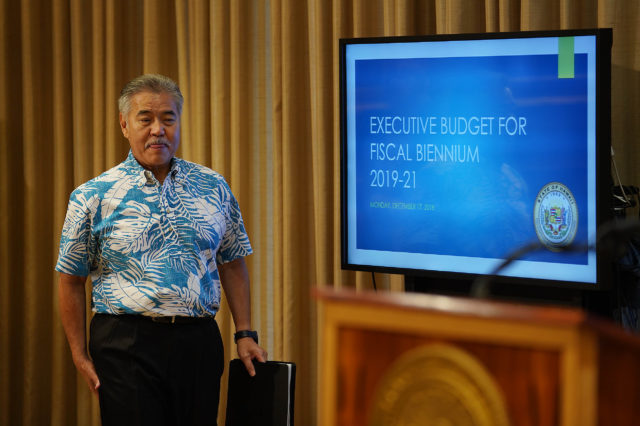The leader of a key legislative committee overseeing the state budget is calling for major reforms in the way the Legislature spends money.
Lawmakers should have more oversight in crafting performance measures the executive branch use to show how effectively it’s using taxpayer money,听said House Finance Committee chair Sylvia Luke.
State agencies currently set the measures and report how well they鈥檙e meeting them, typically with no independent review.
Luke also wants to implement 鈥溾€� in which agencies would start each two-year budget cycle from scratch聽and justify every dollar they’re requesting.
鈥淲e cannot continue to provide these services just because we鈥檝e been doing it,鈥� Luke said. 鈥淲e need measurables.鈥�
It would probably be 2020 before lawmakers聽could begin pushing through the sweeping changes, said Luke. But she hopes to begin laying the groundwork during the 2019 session that starts Jan. 16.
Luke鈥檚 call for greater accountability comes as Gov. David Ige presented his for 2019 through 2021. And it presages a battle between lawmakers and the executive branch heading into the session.
Luke鈥檚 Senate counterpart, Ways and Means Committee Chairman Donovan Dela Cruz, did not return calls for comment. However, Luke said she had spoken to Dela Cruz and that he generally supports the ideas.
Ige was also unavailable for comment Monday, a spokeswoman said.

Luke has repeatedly pushed to get a better handle on government spending that bypasses the Legislature.
For example, in 2013 she helped push through聽legislation聽to stop the proliferation of special and revolving funds, which allow money to be steered straight to executive agencies without approval by the Legislature. State special funds, along with federal money, make up about half of the roughly $14 billion the state spends every year.
Luke also has been working to monitor tax credits and exemptions, which are 聽that bypass the legislative budget process.
But attaching funding to meaningful performance measures may be the most ambitious change Luke has proposed. In theory, executive agencies already track how well they鈥檙e achieving performance goals in documents known as .
Critics say the system is full of holes.
Rachel Hibbard, a former Hawaii state budget analyst and government auditor, noted that the agencies set their own performance measures, the results of which they report themselves without third-party verification.
“Her idea certainly has merit in improving accountability,” said Hibbard, who now works for the California state auditor.
Marion Higa, a former longtime Hawaii state auditor, echoed the criticism of the current system.
鈥淪o many of the documents are just paper exercises,鈥� Higa said of the variance reports.
Luke said she would like the Legislature to be more involved in setting the measures and verifying that the departments are meeting their goals as a condition of giving the agencies more money.
She pointed to early education. Ige on Monday proposed $200,000 in additional funding to staff the state鈥檚 pre-kindergarten program, and some $14.3 million for capital improvements to pre-kindergarten classrooms.
The governor said that research shows such programs produce better outcomes for students and save the state money in the long run. But he acknowledged the administration doesn鈥檛 have data on students now in the program.
The administration鈥檚 聽focus more on how many students are participating and the number of qualified teachers than how well the program is educating children.
Luke noted the first group of students to go through the program will be in third grade this year and will take standardized tests. How well they perform, she said, will be a meaningful measure the state should look at when deciding whether to expand the program.
鈥淚鈥檓 so rooting for those kids,鈥� she said. 鈥淚 just want the (Department of Education) to identify those kids.鈥�
But challenging individual budget requests may be easier than making a sweeping reform to the process.
Higa, who was state auditor for more than 20 years, said the Legislature now has little 鈥渃apacity to challenge what the executive puts forth as a measure of itself.鈥�
To build that capacity would require funding and experienced people, Higa said. And it would have to be rolled out in phases.
鈥淚t鈥檚 too much to gobble up all at once,鈥� she said.
 GET IN-DEPTH
REPORTING ON HAWAII鈥橲 BIGGEST ISSUES
GET IN-DEPTH
REPORTING ON HAWAII鈥橲 BIGGEST ISSUES
We need your help.
Unfortunately, being named a聽finalist for a聽Pulitzer prize聽doesn’t make us immune to financial pressures. The fact is,聽our revenue hasn鈥檛 kept pace with our need to grow,听.
Civil Beat is a nonprofit, reader-supported newsroom based in 贬补飞补颈驶颈. We鈥檙e looking to build a more resilient, diverse and deeply impactful media landscape, and聽we hope you鈥檒l help by .
About the Author
-
 Stewart Yerton is the senior business writer for 天美视频. You can reach him at syerton@civilbeat.org.
Stewart Yerton is the senior business writer for 天美视频. You can reach him at syerton@civilbeat.org.

